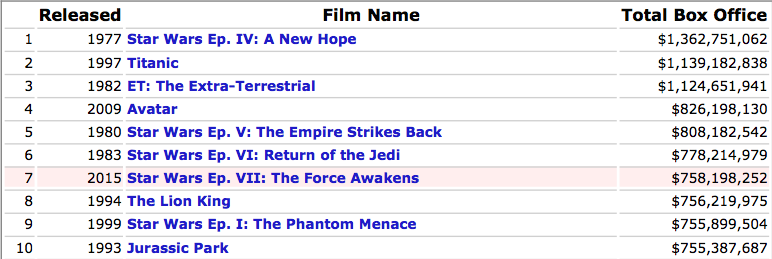Just a few weeks ago, the big and powerful Disney Corporation released a new Star Wars, dropping the mic on all things pop culture. The fact that it’s (a) objectively a great movie, and (b) making heaps of cash, means we need to clarify what Star Wars is, and what it isn’t.
What it is: the most famous Story of our times, therefore probably the most important
Below is a list of the biggest movies since 1966, inflation adjusted, so it’s based sheerly on tickets sold.
Five of the seven Star Wars movies are in the Top 10, which is insane. More people saw Phantom Menace, the crappiest Star Wars installment, in the theater than they did Jurassic Park, Jaws, Forrest Gump, Back to the Future, Raiders of the Lost Ark, or any movie about superheroes.
If commercial appeal doesn’t impress you, maybe gradual brainwashing will.
There are over 270 movies and tv shows (according to nerds) that just make reference to Star Wars, 262 excluding Kevin Smith. Think about it, that’s almost 300 other stories that all found time within their own respective narratives to point at an entirely different story. We are not just all familiar with Star Wars, we seem to be incapable of creating a world where it doesn’t exist.
Luke, I am your father. May the 4th be with you. Spaceballs.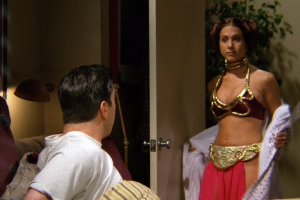 The phrase ‘jedi mind trick.’ President Reagan calling the Soviets the ‘evil empire.’ Even Family Guy, a show known for its commitment to irreverence and blasphemy, did three hours of content that was just the Griffin family…in the Star Wars movies. The onslaught of information has been relentless since the first installment was released in 1977, coming at us from every different direction, at every possible speed. But it’s okay because the media (and I guess, the world) is effectively run by 35-55 y/o white men, who were 3-23 y/o white boys when the original trilogy ended in 1983.
The phrase ‘jedi mind trick.’ President Reagan calling the Soviets the ‘evil empire.’ Even Family Guy, a show known for its commitment to irreverence and blasphemy, did three hours of content that was just the Griffin family…in the Star Wars movies. The onslaught of information has been relentless since the first installment was released in 1977, coming at us from every different direction, at every possible speed. But it’s okay because the media (and I guess, the world) is effectively run by 35-55 y/o white men, who were 3-23 y/o white boys when the original trilogy ended in 1983.
Which brings me to
What it isn’t: a big deal to those of us born post-1980
Think of Star Wars as the Super Bowl of stories, or wait– maybe think of the Super Bowl as the Star Wars of sporting events. Either way, it’s a dope analogy. Stay with me.
Most Americans have seen the new Star Wars film, much like most Americans are going to watch, with varying levels of interest, the Super Bowl. But there’s a difference between the experience of casually watching the Super Bowl and the experience of being a fan of one of the teams involved, much like me being vaguely familiar with the characters and plot points from Star Wars is remarkably different from the ’70s babies whose nascent understanding of good (Luke, the Aryan-lookin fella) and evil (Vader, dude in the black hat) was indelibly shaped by the Star Wars mythos. They never had a choice; you got to root root root for the home team.
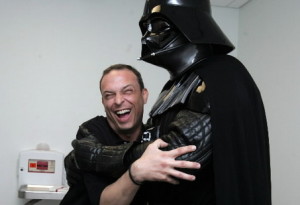 Don’t get me wrong, Star Wars is often, and accurately, advertised as a ‘cultural phenomenon,’ and the fact that that’s not hyperbole is a testament to its appeal across all ages. But have you ever tried having a rational, critical discussion about Star Wars with someone born in the 1970’s? It’s like asking someone born in a monastery why they became a monk. Seriously, you should try it. Find someone that looks to be around 40, introduce yourself, and then call Boba Fett ‘overrated.’ Enjoy the emotional show that follows!
Don’t get me wrong, Star Wars is often, and accurately, advertised as a ‘cultural phenomenon,’ and the fact that that’s not hyperbole is a testament to its appeal across all ages. But have you ever tried having a rational, critical discussion about Star Wars with someone born in the 1970’s? It’s like asking someone born in a monastery why they became a monk. Seriously, you should try it. Find someone that looks to be around 40, introduce yourself, and then call Boba Fett ‘overrated.’ Enjoy the emotional show that follows!
For people of a certain age, Star Wars is not good, nor bad, it just is.
Which brings me to Harry Potter.
I have noticed, and this is going to sound like the most obvious observation in an essay full of obvious observations, that the generation born after me (i.e. 1990’s/2000’s) loves Harry Potter. There are also plenty of people my age who echo that sentiment, but it was at least a choice they made. For people currently 10-25 years old, Harry Potter was at one point an inescapable facet of childhood identity; it’s in their bones.
In other words, Harry Potter is not good, nor bad, it just is.
It’s been written about before, but the parallels between the world of Star Wars and Harry Potter are too clean to be wholly accidental. Like Luke Skywalker, Harry was raised on the outskirts by his aunt and uncle, only to be rescued by a magical, bearded man, who says something like ‘Hey, your destiny is to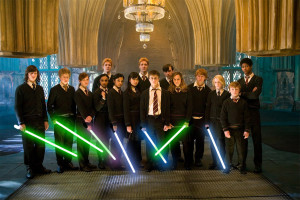 become very special, your Dad was also very special, so come with me and meet all your new father figures.’ Soon Harry learns that he has access to mystical powers, which can be used for good or evil, and he’s the only hope against the embodiment of the latter, i.e. Voldemort, e.g. Vader. So he teams up with his extremely qualified and attractive female friend, as well as a brave-but-in-over-his-head male companion, only to watch their romance blossom as he continues the hero’s journey alone. It’s an epic story full of memorable characters, huge stakes, and constant moral struggle– everything you need to unite an entire generation of children under one storytelling roof.
become very special, your Dad was also very special, so come with me and meet all your new father figures.’ Soon Harry learns that he has access to mystical powers, which can be used for good or evil, and he’s the only hope against the embodiment of the latter, i.e. Voldemort, e.g. Vader. So he teams up with his extremely qualified and attractive female friend, as well as a brave-but-in-over-his-head male companion, only to watch their romance blossom as he continues the hero’s journey alone. It’s an epic story full of memorable characters, huge stakes, and constant moral struggle– everything you need to unite an entire generation of children under one storytelling roof.
It’s easy to forget how immensely popular the Harry Potter franchise was, mostly because the story resolved itself several years ago, and because what the hell have you done for me lately, wizard boy? But starting with the first book being published in 1997 and then the final film being released in 2011, there was a 15-year reign of consistent, celebrated, Harry Potter information shoved in everyone’s face. While the quality of the eight Harry Potter movies remains to be agreed upon, the books are unassailable in their cultural importance.
Here’s a list of the top 16 books sold since 1900.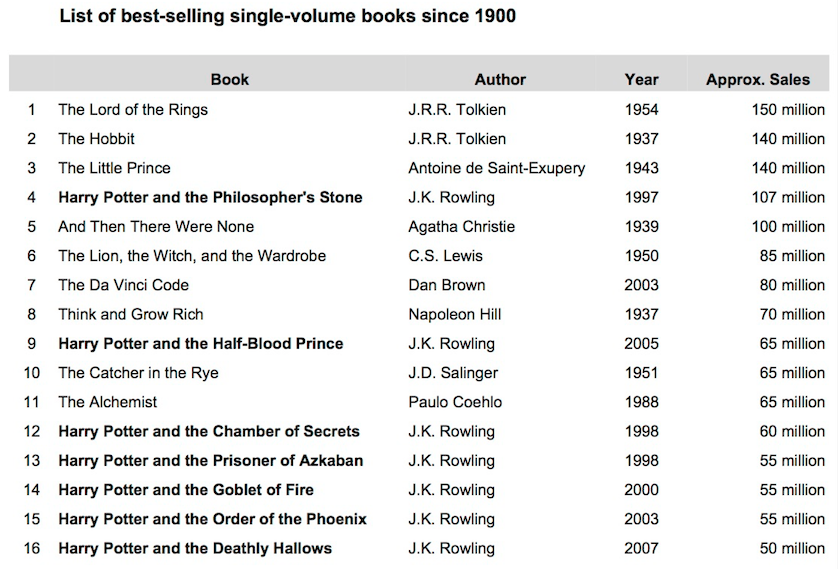
Seven of them are Harry Potter. It’s the bestselling series of all-time, partly because the books were translated into 73 different languages, which only further crystallizes how freaking famous the story of Harry Potter is. You could hop on a conference call right now with a Belgian girl and an Indonesian man and chances are the conversation would be uncomfortable until somebody brought up quidditch.
What’s compelling is the two different paths these franchises took to pop culture domination. The original Star Wars was groundbreaking, but it also arrived during an era of entertainment where there wasn’t much else to obsess over. Forget about there being no Internet, there wasn’t even cable. It just steamrolled every other story, and then just ‘put it in neutral’ for 35 years because the entire generation wouldn’t shut up about it. Harry Potter, on the other hand, has strong claws because it included both books and movies, and took much longer to tell its story. If you were born in 1998, Harry Potter was a bedtime story read to you at night, then you became literate enough to read them on your own, all the while making an annual trip to the movie theater to peep the latest Radcliffe joint and see how ‘Hollywood screwed it up.’
Like Star Wars, Harry Potter is not just a well-oiled machine, it’s completely self-sustaining. It’ll remain relevant throughout our lifetime because once upon a time it forced millions of people, during their 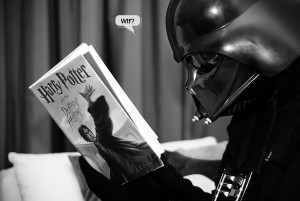 formative years, to understand Good, Evil, and all the other archetypes that epic narratives typically instill. They’ll do a few spin-off movies, then maybe a prequel from Dumbledore’s perspective, then the requisite re-boot, then maybe J.K. Rowling has a nervous breakdown because Harry Potter fanatics don’t approve of the direction the franchise is headed, only for J.J. Abrams, Jr. to take over in 2035 and release a brand new installment called Harry Potter: The Wand Awakens and it will break box office records and Justin Tyrrell, Jr. will write an argumentative essay about how Harry Potter is, without argument, the most famous story of our times.
formative years, to understand Good, Evil, and all the other archetypes that epic narratives typically instill. They’ll do a few spin-off movies, then maybe a prequel from Dumbledore’s perspective, then the requisite re-boot, then maybe J.K. Rowling has a nervous breakdown because Harry Potter fanatics don’t approve of the direction the franchise is headed, only for J.J. Abrams, Jr. to take over in 2035 and release a brand new installment called Harry Potter: The Wand Awakens and it will break box office records and Justin Tyrrell, Jr. will write an argumentative essay about how Harry Potter is, without argument, the most famous story of our times.
Which brings me to Me.
Well not me exactly, but those of us born in the ’80s; too young for Star Wars, too old for Harry Potter. We did not have a huge, meaningful, comprehensive epic that ticked all the boxes like those other two did. Nothing that permanently influenced the way we think.
If you disagree, let’s review the candidates.
Lord of the Rings
Because of its indisputable success, astronomical scale, and Good vs. Evil center, the Lord of the Rings 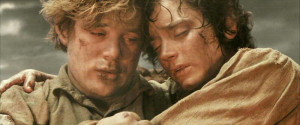 saga is the best parallel to Star Wars and Harry Potter. Including the magical bearded man who visits an asexual hero on the outskirts and says “you have been chosen because of your lineage, and you can save the world if you abstain from evil.”
saga is the best parallel to Star Wars and Harry Potter. Including the magical bearded man who visits an asexual hero on the outskirts and says “you have been chosen because of your lineage, and you can save the world if you abstain from evil.”
But the timing isn’t quite right. The books were written 70 years ago, and the movies (though 10 hours of total running time) were all released in a two-year window from 2001-2003, when my peers and I were grizzled teens of 13-19 years old. If the three Lord of the Rings movies were released, for example, in 1991, 1993, and 1995, respectively, we’d have our answer.
Jurassic Park
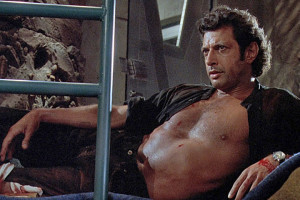 Definitely the most important movie event of my childhood, I didn’t know a single person in 1994 that had not seen it twice in the theater. Even today I manage to hear the Jurassic Park theme song ten times a year. It is the only candidate here that received the same unanimous love as Star Wars did in 1977.
Definitely the most important movie event of my childhood, I didn’t know a single person in 1994 that had not seen it twice in the theater. Even today I manage to hear the Jurassic Park theme song ten times a year. It is the only candidate here that received the same unanimous love as Star Wars did in 1977.
But the subsequent sequels are basically garbage when compared to the original (we call it The Matrix problem), and ultimately that’s because the size and breadth of the Jurassic Park story is minor compared to Harry Potter and Star Wars, which have too many memorable characters and plot points to name. Jurassic Park is an outstanding two-hour story, but it’s no epic.
Batman
This is an interesting wild card because Batman (1989) and 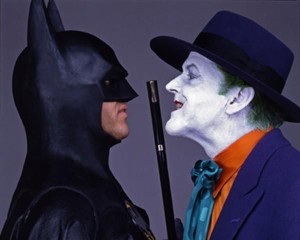 Batman Returns (1992) are two well-made, popular films that indoctrinated millions of kids my age to ‘Hero’ and ‘Villain’ mythology. But I’m not sure we can lay claim to these movies as our own — Batman was on television before we were even born, and the movies were eventually perfected by Christopher Nolan and Heath Ledger. Batman was important to a lot of people, but by no means everybody.
Batman Returns (1992) are two well-made, popular films that indoctrinated millions of kids my age to ‘Hero’ and ‘Villain’ mythology. But I’m not sure we can lay claim to these movies as our own — Batman was on television before we were even born, and the movies were eventually perfected by Christopher Nolan and Heath Ledger. Batman was important to a lot of people, but by no means everybody.
The Disney Renaissance
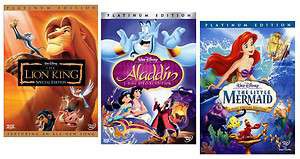 I only recently learned that ‘The Disney Renaissance’ is a thing, but if you don’t know, it refers to The Little Mermaid, Aladdin, and The Lion King, which were released from 1990 to 1994. Holy shit, right? What a run! For people born in the ’80s, these three movies are central to the fabric of their being.
I only recently learned that ‘The Disney Renaissance’ is a thing, but if you don’t know, it refers to The Little Mermaid, Aladdin, and The Lion King, which were released from 1990 to 1994. Holy shit, right? What a run! For people born in the ’80s, these three movies are central to the fabric of their being.
That being said, they are cartoons. And three different stories entirely.
Saved by the Bell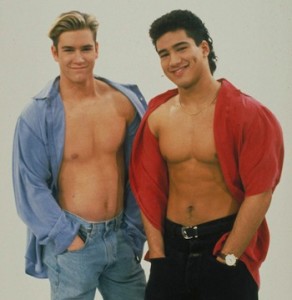
This is the most pathetic idea I have ever entertained, but maybe Saved by the Bell is our Star Wars. I don’t know anyone my age who wasn’t raised by it, who doesn’t still have a debilitating attachment to Bayside lore. My Facebook feed has not recovered from that time last year when the cast re-united on Fallon.
Oh, you think Han Solo’s cool? Get outta here, we had Zack and Slater. Princess Leia is a strong female character? Well, Saved by the Bell had three of those- one hot, one smart, and one diverse. My man Belding personified ‘wisdom’ more than Yoda ever did, and Screech can out-cockblock C3PO any day of the week.
I feel strangely good about all this. There’s a chance I’m grasping here, but I just can’t think of another story that imprinted so much morality and so many archetypes on ’80s babies as Saved by the Bell did. It’s been over 20 years and we still can’t stop referencing it.
Maybe I’m wrong, but we’ll never know. It’s like that old-ass muppet always says, “The enemy of objectivity, nostalgia is.”
- Posted by Justin Tyrrell
- Computer Newspaper
- 0 Comment

